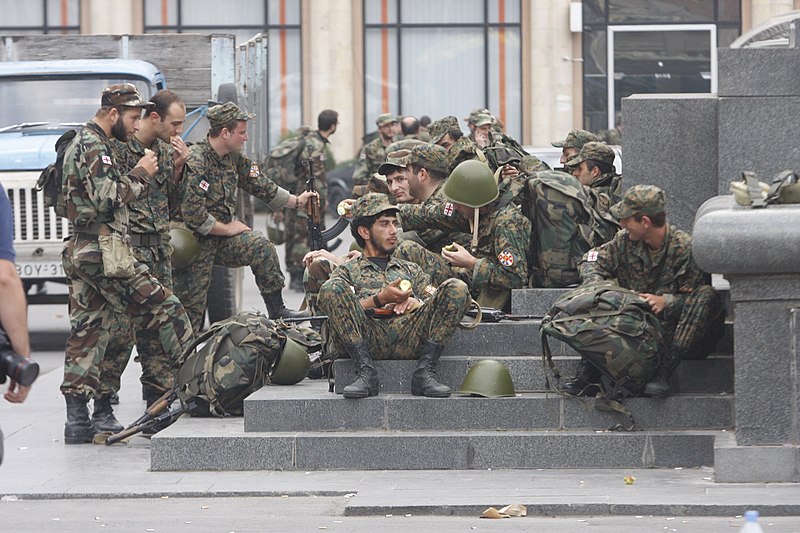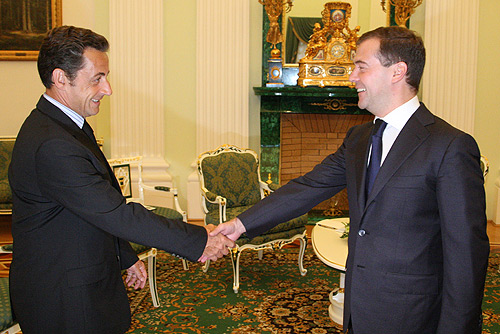Georgia's Challenges: The Ethnic Minority Separatist Movements
Georgia's rich history spans ancient kingdoms like Colchis and Iberia, with Christianity deeply ingrained as a state religion since the 4th century. Despite periods of prosperity under the Bagrationi dynasty (from the Middle Ages until the early 19th century), Georgia faced invasions from neighboring empires such as the Byzantines and Mongols. Its strategic location attracted Persian and Ottoman domination, eventually leading to incorporation into the Russian Empire in the 19th century.
.webp) |
| Image Source: Google, Vladimir Putin |
Shortly before the collapse of the Soviet Union, Georgia declared independence on 9 April 1991. This declaration followed a referendum held on 31 March of the same year, where the Supreme Council of Georgia voted in favor of independence. As a result, Georgia declared itself an independent nation in 1991, following the dissolution of the Soviet Union.
On May 26, 1991, Zviad Gamsakhurdia won a landslide victory in the nationwide elections, becoming the Republic of Georgia's first democratically-elected president. However, the country soon faced challenges from ethnic minority separatist movements, particularly from the regions of South Ossetia and Abkhazia.
💻 Table of Contents:
- Georgia: A Land of Conquests and Divisions
- The Invasion of Georgia: A Prelude to the Crisis in Ukraine
- Passport Diplomacy: Russia's Strategy in Abkhazia and South Ossetia
- Clash of Interests: Georgia's Westward Shift vs. Russia's Influence
- International Stance on Abkhazia and South Ossetia
- Diplomatic Fractures: Russia-Georgia Relations Post-War
- Conclusion: From Civil Strife to Geopolitical Turmoil
Most countries do not consider South Ossetia as part of Russia; only five members of the United Nations recognize it as a sovereign state as of 2024. South Ossetia, a region in Georgia, declared independence in 1990. This led to clashes between the Georgian government and separatist forces. In January 1991, fighting erupted in the South Ossetian capital, Tskhinvali, marking the beginning of the Georgian-Ossetian Conflict.
Similarly, Abkhazia is not universally recognized as its own country, unlike South Ossetia. It is another region in Georgia, sought greater autonomy or secession. Tensions escalated with anti-Georgian riots in 1989. In 1992, Abkhaz separatist forces launched a campaign against the Georgian government. Despite attempts at peace agreements, tensions in these regions have persisted, leading to occasional flare-ups of violence.
Ultimately, these conflicts not only challenged the stability of Georgia's new democracy but also had far-reaching consequences, marking Europe's first war of the 21st century: the Russo-Georgian War of 2008.
Georgia: A Land of Conquests and Divisions
The Russo-Georgian War in 2008 was indeed rooted in the complex historical backdrop of the region. The Kingdom of Georgia emerged in the 11th century and expanded its territories in the Caucasus region, encompassing present-day Georgia, parts of Russia, Armenia, and Azerbaijan.In the 13th century, Georgia came under Mongol rule, while in 1555, Persia and the Ottoman Empire negotiated the Peace of Amasya, dividing Georgia into two parts. These foreign invasions weakened Georgia's sovereignty and led to territorial losses.
By the early 19th century, the Russian Empire expanded its influence in the Caucasus and gradually annexed Georgian territories. In 1801, Georgia was formally incorporated into the Russian Empire as a viceroyalty. Following the Russian Revolution of 1917, Georgia proclaimed independence in 1918 but was eventually incorporated into the Soviet Union in 1922 as the Georgian Soviet Socialist Republic. With the collapse of the Soviet Union in 1991, Georgia regained its independence as the Republic of Georgia. However, this period was marked by political instability, economic challenges, and separatist movements within Georgia's regions.
The Invasion of Georgia: A Prelude to the Crisis in Ukraine
On August 1, 2008, South Ossetian forces, backed by Russia, commenced shelling Georgian villages. Subsequently, on August 8, 2008, the world watched in shock as Russian forces began the invasion of Georgia, sending waves of alarm across the globe. What began as a regional escalation in South Ossetia quickly spiraled into a full-scale war, drawing in Georgia's other separatist region, Abkhazia.
The aftermath of the conflict reshaped geopolitical dynamics in the region and strained relations between Russia and the West, setting a precedent for future crises, including the conflict in Ukraine. Six years after the conflict between Russia and Georgia, Russia initiated another major fight with Ukraine, where Moscow continues to occupy Crimea and large parts of the eastern Ukrainian region of Donbas. The 2008 Russo-Georgian War served as Vladimir Putin's green signal and laid the groundwork for further aggression in the region.
Passport Diplomacy: Russia's Strategy in Abkhazia and South Ossetia
In the late 1990s, the European Union and NATO expanded their influence in Eastern and Central Europe, which was once a Soviet stronghold, causing resentment from Russia and President Vladimir Putin. Meanwhile, Georgia, under the leadership of President Mikheil Saakashvili from 2004, increasingly aligned itself with the West, joining the U.S.-led coalition in the Iraq War. This shift intensified tensions between Georgia and Russia, as Moscow aimed to maintain its sphere of influence in the region.
💻 You May Also Like:
- Semi-militarized Cossacks & Russia's Far Eastern Policy: A Look into Manchuria's Complex Past
- The Yalta Conference: A Political World-Order & American Plan
In the year 2000, the Russian government imposed a visa regime on Georgia, requiring most Georgian citizens to hold a visa to travel to Russia. However, residents of the breakaway regions of Abkhazia and South Ossetia/Tskhinvali Region are exempt from this requirement. This move has raised concerns among the international community, including the United States and the European Union, as it challenges Georgia's sovereignty and territorial integrity.
 |
Image Source: Google, Russo-Georgian War in 2008 |
Amidst the Russia-Georgia war 2008, Georgian President Mikheil Saakashvili announced Georgia's intention to withdraw from the CIS (A Regional Organization comprising former Soviet republics), blaming the organization for failing to prevent the conflict in South Ossetia. The withdrawal process was completed one year later, marking the final step in Georgia's departure from the post-Soviet regional grouping. Saakashvili also urged Ukraine to exit CIS, a former Soviet Republic alliance. All these events subsequently sparked discontent between Moscow and Tbilisi.
To solidify its influence, Russia initiated a policy of distributing Russian passports to residents of Abkhazia and South Ossetia without Georgia's consent, laying the groundwork for future claims to these territories. President Putin even considered military solutions to the conflict by 2003.
In 2006, Georgia's deportation of suspected Russian spies prompted Russia to retaliate with diplomatic and economic measures, escalating tensions further. By 2008, a significant portion of South Ossetia's population held Russian passports, indicating Russia's deep involvement in the region. Presently, these two regions, each with its own distinct language, have been de facto independent since the 1990s civil war. They are controlled by local separatist authorities supported by Russia, and each has its own defined territory.
Clash of Interests: Georgia's Westward Shift vs. Russia's Influence
The 2008 war was not an isolated event but rather the culmination of decades of unresolved disputes and escalating tensions. Georgia's aspirations for closer ties with the West, including NATO membership, clashed with Russia's interests in maintaining influence in its neighboring states. Meanwhile, the unilateral declaration of independence by Kosovo in 2008 fueled secessionist sentiments in Abkhazia and South Ossetia, further exacerbating the situation.
When violence erupted in South Ossetia in August 2008, the question of who initiated the conflict remains contentious. Some argue that Georgia's military actions were provoked by Russian and separatist forces, while others point to Georgia's frustration with stalled negotiations and perceived Western support as contributing factors.
Regardless of the initial trigger, the war resulted in significant humanitarian and economic consequences. Thousands were displaced, and infrastructure was devastated. The European Union's independent report on the war attributed blame to both sides, highlighting Georgia's heavy artillery attack on Tskhinvali and Russia's illegal occupation of Georgian territory.
Besides, after the dissolution of the Soviet Union, the Parliament of Georgia passed several initiatives establishing Georgian as the sole official state language in August 1989. This decision contributed to ethnic and linguistic divisions within Georgia, particularly among minority populations who spoke languages other than Georgian. The imposition of Georgian as the official language led to protests and resistance from these minority groups, exacerbating existing grievances and contributing to the escalation of conflict.
International Stance on Abkhazia and South Ossetia:
On August 26, 2008, following the armed conflict between Georgia and the breakaway regions of South Ossetia and Abkhazia, Russia officially recognized their independence. The move was backed by the parliaments of both regions and supported by then-Russian President Dmitry Medvedev, citing the will of the Ossetian and Abkhazian peoples. This recognition was followed by the establishment of diplomatic relations and the signing of bilateral agreements between Russia and the newly recognized states.
Several other nations, including Nicaragua, Venezuela, and Nauru, also recognized the independence of Abkhazia and South Ossetia. However, their recognition faced varying levels of international acceptance, with some countries subsequently withdrawing (Tuvalu and Vanuatu) their support in favor of diplomatic relations with Georgia.
 |
Image Source: Google, Dmitry Medvedev meets with Nicolas Sarkozy |
In 2018, the Syrian Arab Republic also agreed to mutual recognition and established diplomatic relations with South Ossetia and Abkhazia. While some nations recognized the independence of these regions, others chose to maintain diplomatic ties with Georgia, highlighting the complex geopolitical dynamics at play.
The United States reaffirms its stance that Abkhazia and South Ossetia are internationally recognized as integral parts of Georgia. It commends Georgia for its consistent commitment to resolving the conflict without resorting to the use of force.
Meanwhile, the European Union has expressed strong concern over Russia's intention to establish a permanent naval base for its Black Sea Fleet in Georgia’s Abkhazia region. Such actions are deemed illegal, violating Georgia's sovereignty and territorial integrity, as well as international law and commitments. The EU emphasizes its unwavering support for Georgia's independence, sovereignty, and territorial integrity within its internationally recognized borders, condemning any actions that could escalate tensions and destabilize the region.
On August 12, 2008, the EU and Russia agreed to a ceasefire plan, called the "Medvedev-Sarkozy-Saakashvili plan." It aimed to stop fighting, allow aid, and pull out Georgian and Russian troops. French President Nicolas Sarkozy and Georgian President Mikheil Saakashvili helped broker the deal. This marked an important step to end the conflict and start talks.
Diplomatic Fractures: Russia-Georgia Relations Post-War
The aftermath of the war saw Russia officially recognizing Abkhazia and South Ossetia as independent states, further straining diplomatic relations with Georgia. Despite ongoing tensions, economic ties between Russia and Georgia have persisted, underscoring the complexity of their relationship.
Looking ahead, the path to reconciliation remains challenging. While Georgia has signaled willingness to accept high degrees of self-rule in Abkhazia, the situation in South Ossetia is more complex. Russia's support for the separatist regions complicates efforts towards resolution, with annexation posing additional risks and challenges.
Ultimately, the Russo-Georgian War of 2008 serves as a sobering reminder of the enduring complexities of regional conflicts and the delicate balance of power in the Caucasus. As stakeholders continue to navigate the aftermath, the search for lasting peace and stability remains paramount.
Conclusion: From Civil Strife to Geopolitical Turmoil
The Georgian Civil War (1991-1993) started due to demands for independence, ethnic tensions, political instability, and the language issue. The conflict was further influenced by Kosovo's unilateral declaration of independence in 2008, Georgia's alignment with the West, and Russia's regional influence. These factors ultimately led to the Russo-Georgian War of 2008.
The Russo-Georgian War of 2008 stands as a testament to the enduring tensions and complexities of regional conflicts. It marked a pivotal moment in the geopolitical landscape of the Caucasus, reshaping diplomatic relations and deepening divisions between Russia and Georgia. Despite ongoing challenges, efforts towards reconciliation and lasting peace remain essential for the stability and prosperity of the region. As Georgia continues to navigate its path forward, the international community must remain engaged and committed to upholding the principles of sovereignty, territorial integrity, and peaceful resolution of disputes.





.webp)